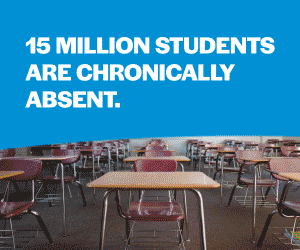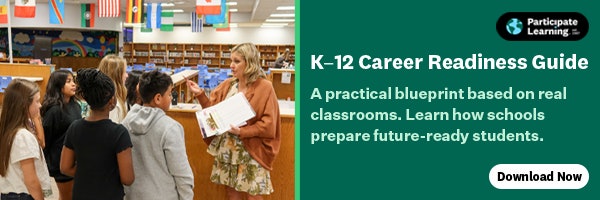 In an effort to understand and raise the level of kindergarten readiness in the state, Maine recently formed a committee of 32 kindergarten teachers to evaluate readiness assessment tools under consideration.
In an effort to understand and raise the level of kindergarten readiness in the state, Maine recently formed a committee of 32 kindergarten teachers to evaluate readiness assessment tools under consideration.
A 2024 study conducted by state researchers found that the KIDS assessment can accurately predict how students will perform on state standardized tests, such as the Illinois Assessment of Readiness, in third grade.
In other words, the students who are most ready for kindergarten are most likely to succeed academically in the future.
Defining readiness
Kindergarten readiness refers to the skills and abilities students need to succeed in school, including social and emotional development, language acquisition, physical well-being, and early cognitive skills like math and literacy. According to the U.S. Government Accountability Office, 27 states required districts to administer a kindergarten entry assessment during the 2023–2024 school year, but approaches to determining readiness can vary widely.
Matt Brunetti, senior program associate at WestEd, says readiness efforts are most effective when schools, districts, and states have a clear and shared understanding of what they expect from students and from educators. “Kindergarten readiness is not just about academic skills,” he says. “It’s about social-emotional development, physical readiness, and creating environments where children can thrive.”
Readiness boot camp
In Pennsylvania’s Pennsbury School District, Assistant Superintendent of Curriculum and Instruction Theresa Ricci recognized a growing need to prepare incoming kindergarteners for school. In the 2023-24 school year, she formed a kindergarten committee to evaluate how instructional time was being used and explore ways to better support new students.
“There were no alarming indicators,” she says. “It was more about how we could use time differently to improve math and reading instruction.”
One of the committee’s ideas was to create a kindergarten readiness camp held before the school year begins. Pennsbury will introduce a four-day camp in July 2025. “Students come to us with varying experience with school,” Ricci said at a school board meeting explaining the rationale behind the camp. “Some have been to preschool for years, while others have never been in any kind of a school setting.”
The readiness boot camp will introduce incoming kindergarten students to classroom routines, basic social-emotional skills, and the structure of a typical school day. The camp will be staffed by district teachers, as well as paraprofessionals and instructional aides as needed. Parents can also attend an information session to learn other ways to support their child’s transition to school.
The district will charge $200 per student to attend, with need-based scholarships available. “We hope this helps level the playing field from day one,” Ricci says.
State-level initiatives
While districts like Pennsbury experiment with initiatives like these, states are working to define and measure kindergarten readiness more effectively. Maryland has conducted statewide kindergarten assessments for the past decade. Indiana’s Birth through Five Strategic Plan adopted in 2020 has among its stated goals to “support strong transitions to school and kindergarten readiness.”
Other states see a need but are still honing their approach. In Utah, the state board of education recently phased out its Kindergarten Entry Profile (KEEP) assessment in favor of a more holistic approach. “We need to understand where each child is and provide support accordingly,” says Jared Lisonbee, preschool education specialist with the Utah State Board of Education.
Maine formed a committee of 32 kindergarten teachers to test different readiness assessment tools and provide feedback. According to Lee Ann Larsen, director of early learning at the Maine Department of Education, the goal is to help teachers understand each child’s strengths from the start. “If you meet a child where they’re at, you can usually avoid the frustration and anxiety that we see in little ones when they don’t know something,” she says.
The role of early childhood education
Experts agree that strong early childhood education programs significantly influence kindergarten readiness. High-quality preschool, strong family engagement, and clear expectations for school readiness can set students up for success.
Emily Hanno, senior research associate at MDRC, underscores the importance of making readiness assessments useful. “It’s not enough to say a child is ready or not ready. We need to provide teachers with actionable insights that inform instruction.” MDRC is currently developing early learning assessment tools to gauge a child’s development more accurately.
New Mexico has taken steps to expand its statewide free pre-K program, with a proposed 2026 budget that will make pre-K available to 96 percent of state four-year-olds, in part to improve kindergarten readiness. The curriculum emphasizes executive functioning skills to help students develop attention, memory, and self-regulation abilities.
Family engagement
Many educators and policymakers have also recognized the importance of family engagement. Promise Partnership Utah piloted a Kindergarten Transition Toolkit that connects preschool families with elementary schools before kindergarten starts. Families attend orientation events, receive resource materials, and build familiarity with their child’s future school.
This proactive approach has increased kindergarten registration and reduced first-day anxieties for both children and parents. Kelly Noorda, lead network director of Promise Partnership Utah and chair of the Early Childhood Utah Early Care and Education Subcommittee, says the goal is to make kindergarten readiness a community-wide effort. “If we can start building connections early,” she says, “children enter school feeling supported, and that’s when real learning can begin.”
Ellen Ullman is a freelance writer and contributor to DATIA K12.


























